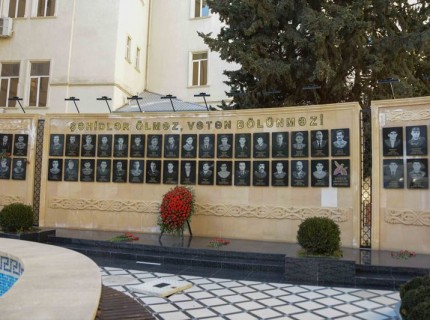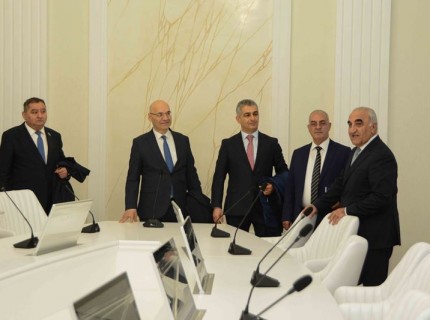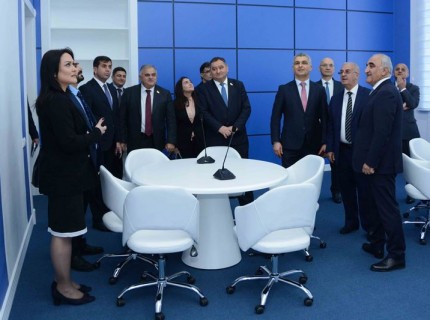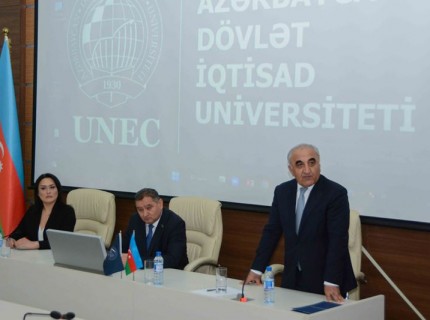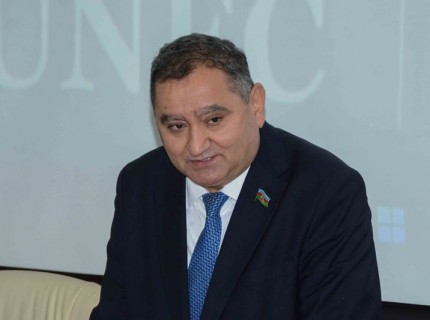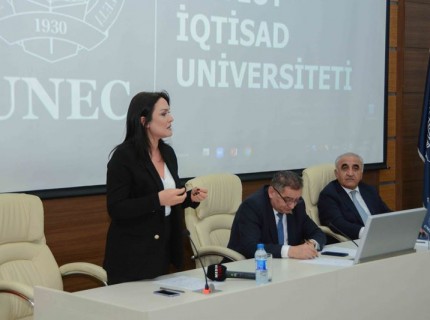The first at universities: Rector gave a report before the Public Council
The rector of UNEC, Professor Adalat Muradov made a report on the work done at the university in front of the Public Council.
The reporting event has been attended by the members of the Public Supervisory Council, MPs Etibar Aliyev, Hikmat Mammadov, Arzu Nagiyev, Professor Shahlar Askerov, General Director of “Modern” Media Group, Chairman of the Union of Parliamentary Journalists Elshad Eyvazli, Head of the Constitutional Research Fund, the executive director of Transparency Azerbaijan Public Association.
Alimammad Nuriyev, Osman Gunduz, director of the “Multimedia” Information Systems Technologies Center, president of the Azerbaijan Internet Forum, Sahib Mammadov, head of Citizens’ Labour Rights Protection League, Ilgar Orujov, head of the Azerbaijan Society of Young Scientists, Doctoral and Master students, Sevinj Garayeva, the reporter of “The 525th newspaper”, Gunel Safarova, the chairman of the Public Council under the Ministry of Science and Education, media representatives and structural leaders of the university.
Before the event, the participants honored the memory of the martyrs in front of the Memorial Monument Complex erected in memory of martyred students and graduates of UNEC. Then they got acquainted with the 24/7 library, the Extern Center, the Bloomberg laboratory, as well as the facilities created in the newly renovated Career Center and the Small Assembly Hall.
Member of Parliament, the Chairman of the Public Supervisory Council under UNEC Etibar Aliyev called the rector’s reporting to the public a novelty in the country and said that this novelty would be an occasion for new challenges. The Chairman of the Council said that the activity of the public councils supports the better organization of work in the institutions, and pointed out that UNEC has achieved significant success in recent times and has the status of a developing university.
Then Rector Adalat Muradov made a report. He said that UNEC’s main goal in 2030 is to enter the world’s top 500 university ranking.
The report stated that admissions are being made to 22 undergraduate majors, 20 graduate majors, and 29 MBA majors at UNEC, which provides education in 4 languages. 8 new majors in the MBA program were created in 2022.
Compared to 2013/2014, the number of undergraduate students increased by 4.01 percent, master’s by 7.1 percent, and MBA by 54.08 percent. The admission plan increased by 3.57 percent, 62.8 percent, and 84.8 percent for the respective education levels.
It was reported that the education management system at UNEC has been completely digitized. The EDUMAN system is applied in the organization of teaching. Also, since 2015, document circulation is carried out through the Electronic Document Circulation System, not on paper carriers.
100 hybrid auditoriums were created in order to democratize and humanize teaching. Students can listen to lectures on 53 specialized subjects either remotely or in traditional form. Lectures on 13 non-specialized subjects are conducted only remotely.
Since 2019, “One Window Service” has been active for students to obtain educational documents more conveniently and quickly. In 2022/2023 alone, 17,000 students applied to One Window Service.
Continuing higher education and admission of foreigners at UNEC is fully electronic and carried out online.
For the first time in the region, from the new academic year, the “Flipped Education” method, which fundamentally changes the modern teaching method, is being applied at UNEC. The main feature of the method applied in the world’s leading universities is the transfer of knowledge during classes in audio, video, infographic, and written form, which students can understand more easily.
It was noted that the phased abolition of session exams, which is also applied in world practice, is one of the strategic goals. Assessment of student knowledge can be done on the basis of the project given to him.
Important successes have also been achieved in the direction of turning UNEC into a research university. Thus, 88 percent of the 755 UNEC articles published in Web of Science-indexed journals, and 96 percent of the 703 articles published in Scopus-indexed journals fall in the 2014/2022 period.
In order to stimulate the research activity of teachers, a differential salary system is applied in UNEC, and 70% of this system is attributed to scientific research. The salaries of teachers in the first ten are increased twice. It was noted that a differential salary system based on the assessment of the service performance of administrative workers has been developed and will be implemented soon.
Rector said that along with academic transcripts, non-academic transcripts will also be given in order to evaluate the student’s knowledge and skills. This will create great opportunities in their future careers. By reading the QR code on the transcript, the employer will also find out what skills the student has.
“UNEC students must know at least one foreign language when they graduate,” emphasized the rector, noting that English is taught over 4 skills for 2 years at the university. A. Muradov said that the Language Center, which is an IELTS partner at UNEC, has started its activities and the first exams were held in December.
It was noted that UNEC has achieved serious success by taking place in international rankings. UNEC is ranked 1001-1200 in the QS world ranking, 221-230 in the QS regional ranking, 801+ in the Times Higher Education Impact Rankings, 251-300 in the U-Multirank world ranking, and among the 18 best universities in Asia.
Speaking about the activities of the libraries, the rector said that the number of books in the UNEC Library Information Center has increased to 85,250 copies, and the number of electronic resources is over one million.
Another innovation at UNEC is the establishment of the Assistantship institute. Assistants and executive assistants will replace the laboratory assistants working in the departments. Executive assistants will play an important role in the formation of the future teacher base.
Adalat Muradov noted that the Lifelong Education Center at UNEC has started its activities, and courses, pieces of training, and specialist training are conducted in the center, which is a commercial-oriented faculty.
It was reported that in order to improve the social welfare of UNEC employees, the average monthly salary at the university was increased by 1.92 times. This is an increase of 1.96 times for the teaching staff and 2 times for the administrative staff.
After hearing the report, Council members shared their views.
Gunel Safarova, chairman of the Public Council under the Ministry of Science and Education, called the rector’s reporting to the Public Council the basis of the new movement and emphasized the importance of applying this practice in other higher education institutions.
MP Hikmet Mammadov called the rector’s report “Hope”. Appreciating the experience of UNEC in the direction of forming a new generation university model, the deputy called the formation of the University of Economics with a positive image as a UNEC brand in the public a great success of the university.
Professor Shahlar Askerov pointed out that as a member of the Public Supervisory Council, he closely follows the innovations in the university, and said that UNEC has created a model of a higher education institution that meets new challenges in terms of management, content of education, and structure.
President of Azerbaijan Internet Forum Osman Gunduz stated that UNEC has applied important innovations in the field of digitization and digital transformations and wished the rector success in the future activities of the university.

